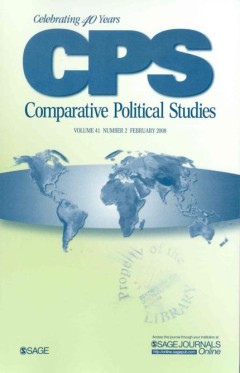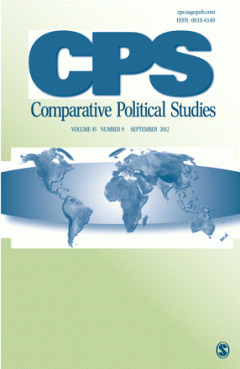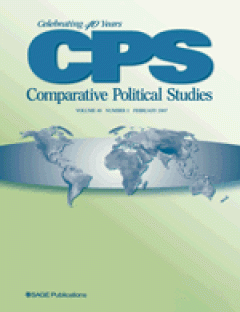Filter by

Policy Uncertainty in Hybrid Regimes: Evidence From Firm-Level Surveys
Cross-national surveys suggest that regulatory and policy uncertainty is an important constraint on investment in developing countries. Yet there has been little direct empirical investigation of the sources of this uncertainty. This article presents evidence of an inverted U-shaped relationship between firms’ perceptions of policy uncertainty and political regime type. Firms in hybrid regimes …
- Edition
- Vol. 43, No. 4, April 2010. pp. 486-510
- ISBN/ISSN
- 00104140
- Collation
- -
- Series Title
- Comparative Political Studies
- Call Number
- -

Serving Citizens: How Comparable Are Polish and Russian "Street-Level" Bureau…
An experimental survey on bureaucratic responsiveness in the social welfare arena in Poland and Russia shows that both countries’ social welfare workers are capable of performing in a manner deemed helpful to local Polish and Russian citizens—a key component of effective governance. Such findings are surprising given an absence of reforms to create Weberian bureaucracies out of both countries’ …
- Edition
- Vol. 43, No. 5, May 2010. pp. 578-605
- ISBN/ISSN
- 00104140
- Collation
- -
- Series Title
- Comparative Political Studies
- Call Number
- -

Why Respecting Physical Integrity Rights Reduces Terrorism
Does respect for human rights check or promote terrorism? This question is hotly debated within policy circles. Some hold that restricting human rights is a necessary if unfortunate cost of preventing terrorism. Others conclude that such abuses aggravate political grievances that contribute to terror. The authors demonstrate that theory and data support the latter position. They hypothesize tha…
- Edition
- Vol. 43, No. 5, May 2010. pp. 551-577
- ISBN/ISSN
- 00104140
- Collation
- -
- Series Title
- Comparative Political Studies
- Call Number
- -

Decentralization and the Development of Nationalized Party Systems in New Dem…
The extent to which a party system is nationalized—with nationalization being defined as the degree to which major political parties obtain similar vote shares throughout the national territory—has considerable consequences for political representation, public policy making, and even the survival of democracy. Yet, so far there is little empirical evidence about the conditions that promote or i…
- Edition
- Vol. 43, No. 5, May 2010. pp. 606-627
- ISBN/ISSN
- 00104140
- Collation
- -
- Series Title
- Comparative Political Studies
- Call Number
- -

When Are Concerted Reforms Feasible? Explaining the Emergence of Social Pacts…
Under what conditions do governments, employers, and unions enter formal policy agreements on incomes, employment, and social security? Such agreements, widely known as social pacts, became particularly prominent during the 1990s when European economies underwent major adjustment. This article seeks to explain national variation in adjustment strategies and specifically why concerted agreements…
- Edition
- Vol. 43, No. 5, May 2010. pp. 628-657
- ISBN/ISSN
- 00104140
- Collation
- -
- Series Title
- Comparative Political Studies
- Call Number
- -

Aid Effectiveness and the Politics of Personalism
This article examines how political institutions that provide an incentive to cultivate a personal vote condition the relationship between foreign aid and economic growth in developing country democracies. Politicians in aid-recipient countries with high levels of personalism are more likely to pursue corruption and target government spending to narrow constituencies. Because personalism affect…
- Edition
- Vol. 43, No. 6, June 2010. pp. 735-762
- ISBN/ISSN
- 00104140
- Collation
- -
- Series Title
- Comparative Political Studies
- Call Number
- -

Elections in Rural China: Competition Without Parties
Village elections in China present scholars with the case of a single-party regime that allows voters to reject candidates regularly. Using a micro survey of 698 voters in 30 rural election districts, the authors demonstrate that when some candidates can lose, voters participate. A comparison of models of voter turnout and running for office further demonstrates that even when competition is st…
- Edition
- Vol. 43, No. 6, June 2010. pp. 763-790
- ISBN/ISSN
- 00104140
- Collation
- -
- Series Title
- Comparative Political Studies
- Call Number
- -

The Politics of Inequality: Voter Mobilization and Left Parties in Advanced I…
Why is it that some countries have witnessed significant increases in inequality since the 1960s while at the same time experiencing very little change in the way politics is conducted? And why is it that in other countries, where inequality has increased much less, the Left has become substantially more redistributive? The answer, the authors argue, has to do with the interaction between inequ…
- Edition
- Vol. 43, No. 6, June 2010. pp. 675-705
- ISBN/ISSN
- 00104140
- Collation
- -
- Series Title
- Comparative Political Studies
- Call Number
- -

Revisiting the Single European Act (and the Common Wisdom on Globalization)
The European program of liberalization launched by the Single European Act (SEA) of 1987 is commonly seen as a powerful instance of "globalization" trends of economic integration, liberalization, and international institution building. This article revisits the origins of the SEA to argue that the extent and success of its liberalizing program depended on a causally distinct push for European i…
- Edition
- Vol. 43, No. 6, June 2010. pp. 706-734
- ISBN/ISSN
- 00104140
- Collation
- -
- Series Title
- Comparative Political Studies
- Call Number
- -

Class, Status, and Party: The Changing Face of Political Islam in Turkey and …
This article argues that socioeconomic changes within Islamist constituencies are critical parts of understanding of how moderate Islamists emerge and succeed. The diverging paths of economic reform in Turkey and Egypt have generated different effects on the Islamist constituencies in these two countries. Economic liberalization has played both a constitutive and a causal role in transformation…
- Edition
- Vol. 43 no. 7, July 2010, pp. 835-861
- ISBN/ISSN
- 00104140
- Collation
- -
- Series Title
- Comparative Political Studies
- Call Number
- -

Informative Regress: Critical Antecedents in Comparative Politics
How can political scientists best uncover historical causation without committing infinite regress? This article introduces a revised framework for historical analysis that can help systematically capture the deepest causal factors in political development. It improves on the familiar “critical juncture” framework by specifying the precise causal or noncausal status of the “antecedent condition…
- Edition
- Vol. 43 no. 7, July 2010. pp. 886-917
- ISBN/ISSN
- 00104140
- Collation
- -
- Series Title
- Comparative Political Studies
- Call Number
- -

The Political Economy of Authoritarian Single-Party Dominance
Why do authoritarian dominant parties, once established, continue to win elections or lose power? Employing a time-series cross-national analysis of election outcomes and two country case studies, the author shows that dominant parties endure despite poor economic performance, voter demand for new parties, and sufficiently permissive electoral institutions. Instead, the author demonstrates that…
- Edition
- Vol. 43 no. 7, July 2010. pp. 807-834
- ISBN/ISSN
- 00104140
- Collation
- -
- Series Title
- Comparative Political Studies
- Call Number
- -

Institutional Feedback and Support for the Welfare State: The Case of Nationa…
Researchers interested in the political consequences of the welfare state argue that cross-country variations in the design of social policy institutions produce distinct patterns of public support for the welfare state. This research proposes an institutional feedback effect in which welfare institutions, once created, transform political debate, generate new constituencies, and alter how indi…
- Edition
- Vol. 43 no. 7, July 2010. pp. 862-885
- ISBN/ISSN
- 00104140
- Collation
- -
- Series Title
- Comparative Political Studies
- Call Number
- -

Beyond Dictatorship and Democracy: Rethinking National Minority Inclusion and…
Most standard models of democratization privilege class-based actors and the regimes they prefer to account for patterns of dictatorship and democracy. These models are ill suited, however, to explain political regime change in interwar Eastern Europe, where the dominant cleavage was not class but nationality. As a consequence, neither the process of regime change nor the resulting regime outco…
- Edition
- Vol. 43 no. 8-9, August 2010. pp. 1089-1118
- ISBN/ISSN
- 00104140
- Collation
- -
- Series Title
- Comparative Political Studies
- Call Number
- -

Diffusion and the Constitutionalization of Europe
This article begins with a rather forceful defense of the explanatory role of formal institutions—and, in particular, constitutions—in the study of democratization. Important aspects of constitutions play a significant part in shaping the quality, type, and survival of institutional arrangements in new democracies. With this assumption, the article turns seriously to theories of constitutional …
- Edition
- Vol. 43 no. 8-9, August 2010, pp. 969-999
- ISBN/ISSN
- 00104140
- Collation
- -
- Series Title
- Comparative Political Studies
- Call Number
- -

Reading History Forward: The Origins of Electoral Systems in European Democra…
This article reexamines the reconfiguration of electoral systems in European democracies in the first age of democratization. Rather than asking why some countries maintained the status quo whereas others “switched” to proportional representation (PR), the author argues that both single-member plurality (SMP) and PR were departures from the predemocratic electoral institutions in most of Europe…
- Edition
- Vol. 43 no. 8-9, August 2010, pp. 1059-1088
- ISBN/ISSN
- 00104140
- Collation
- -
- Series Title
- Comparative Political Studies
- Call Number
- -

The Founding of the French Third Republic
How France became a consolidated democracy after the Franco-Prussian War of 1870 has received little attention from students of comparative democratization. Contrary to earlier structural theories, the French case shows that in periods of high social uncertainty, political elites with clear ideological visions of the future have a strategic advantage over their more “pragmatic” opponents. Clear…
- Edition
- Vol. 43 no. 8-9, August 2010. pp. 1023-1058
- ISBN/ISSN
- 00104140
- Collation
- -
- Series Title
- Comparative Political Studies
- Call Number
- -

The Historical Turn in Democratization Studies: A New Research Agenda for Eur…
This article lays the theoretical and methodological foundations of a new historically minded approach to the comparative study of democratization, centered on the analysis of the creation, development, and interaction of democratic institutions. Historically, democracy did not emerge as a singular coherent whole but rather as a set of different institutions, which resulted from conflicts acros…
- Edition
- Vol. 43 no. 8-9, August 2010, pp. 931-968
- ISBN/ISSN
- 00104140
- Collation
- -
- Series Title
- Comparative Political Studies
- Call Number
- -

Interests, Inequality, and Illusion in the Choice for Fair Elections
Why do actors in transitional governments choose to hold fair elections when so many other options are available? The answer to this question is key to understanding an essential element of democracy’s institutional collage. This essay explores the choice of fair elections through the comparison of two episodes in Portuguese history: the elections held at the founding of the First Republic (whi…
- Edition
- Vol. 43 no. 8-9, August 2010, pp. 1119-1147
- ISBN/ISSN
- 00104140
- Collation
- -
- Series Title
- Comparative Political Studies
- Call Number
- -

The Diffusion of Regime Contention in European Democratization, 1830-1940
This article goes beyond the established literature’s focus on domestic conditions by examining the impact of external impulses on European democratization from 1830 to 1940. Specifically, it analyzes the diffusion of regime conflict that arose from the cross-national spread of situational judgments about the feasibility of political change: Striking precedents of regime collapse, such as the o…
- Edition
- Vol. 43 no. 8-9, August 2010, pp. 1148-1176
- ISBN/ISSN
- 00104140
- Collation
- -
- Series Title
- Comparative Political Studies
- Call Number
- -
 Computer Science, Information & General Works
Computer Science, Information & General Works  Philosophy & Psychology
Philosophy & Psychology  Religion
Religion  Social Sciences
Social Sciences  Language
Language  Pure Science
Pure Science  Applied Sciences
Applied Sciences  Art & Recreation
Art & Recreation  Literature
Literature  History & Geography
History & Geography